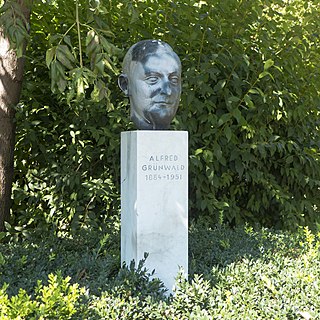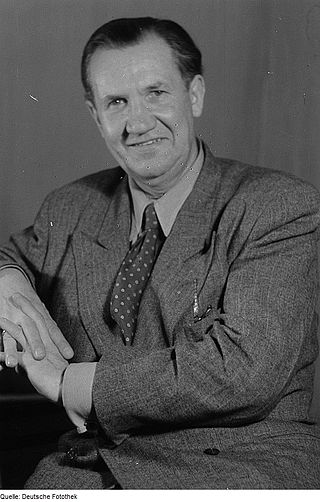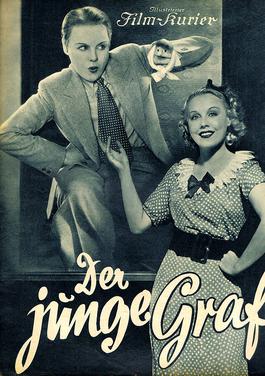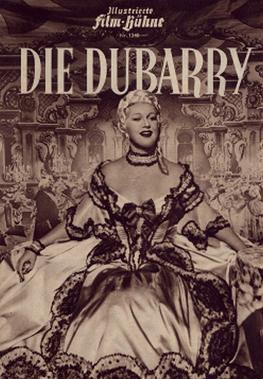
Juliane "Liane" Haid was an Austrian actress and singer. She has often been referred to as Austria's first movie star.

Emmerich Kálmán was a Hungarian composer of operettas and a prominent figure in the development of Viennese operetta in the 20th century. Among his most popular works are Die Csárdásfürstin (1915) and Gräfin Mariza (1924). Influences on his compositional style include Hungarian folk music, the Viennese style of precursors such as Johann Strauss II and Franz Lehár, and, in his later works, American jazz. As a result of the Anschluss, Kálmán and his family fled to Paris and then to the United States. He eventually returned to Europe in 1949 and died in Paris in 1953.

Die Zirkusprinzessin is an operetta in three acts by Hungarian composer Emmerich Kálmán to a German libretto by Julius Brammer and Alfred Grünwald. It premiered at the Theater an der Wien in Vienna on 26 March 1926 and went on to 344 performances there.

Alfred Grünwald (1884–1951) was an Austrian author, librettist, and lyricist. Some of his better-known works were written in conjunction with the composers Franz Lehár, Emmerich Kálmán, Oscar Straus, Paul Abraham, and Robert Stolz.
Mr Cinders is a 1928 musical with music by Vivian Ellis and Richard Myers and a libretto by Clifford Grey and Greatrex Newman. The story is an inversion of the Cinderella fairy tale with the gender roles reversed. The Prince Charming character has become a modern (1928) young and forceful woman, and Mr Cinders is a menial.

La Grande-Duchesse de Gérolstein is an opéra bouffe, in three acts and four tableaux by Jacques Offenbach to an original French libretto by Henri Meilhac and Ludovic Halévy. The story is a satirical critique of unthinking militarism and concerns a spoiled and tyrannical young Grand Duchess who learns that she cannot always get her way.

Kurt-Friedrich Gänzl is a New Zealand writer, historian and former casting director and singer best known for his books about musical theatre.

Fritz Kampers was a German film actor. He appeared in more than 250 films between 1913 and 1950.
Franz Schulz was a playwright and screenwriter who worked from 1920 through 1956.

Julius Brammer was an Austrian librettist and lyricist. Some of his better-known works were written in conjunction with the composers Emmerich Kálmán, Oscar Straus, Leo Ascher, Edmund Eysler and Robert Stolz.
Catherine the Great is a 1920 German silent historical film directed by Reinhold Schünzel and starring Lucie Höflich, Fritz Kortner, and Fritz Delius. The film was an epic portrayal of the life of Catherine the Great of Russia. 4,000 extras and 500 horses were used.

Curt Courant was a German-American cinematographer whose work includes more than 100 German and international films from the silent and early sound eras. Courant worked in several European countries, collaborating with figures such as Fritz Lang, Alfred Hitchcock and Charlie Chaplin. As he was of Jewish ancestry, Courant was forced to leave Germany in 1933 and go into exile following the Nazi takeover of power.

The Young Count is a 1935 Czech-German comedy film directed by Carl Lamac and starring Anny Ondra, Hans Söhnker and Fritz Odemar. It is set around the circus, part of a subgenre of Circus films. It was shot at the Tempelhof Studios in Berlin. The film's sets were designed by the art directors Wilhelm Depenau and Erich Zander.

The Circus Princess is a 1925 German silent film directed by Adolf Gärtner and starring Josefine Dora, Olga Engl and Johanna Ewald. It is based on the operetta Die Zirkusprinzessin. Another German silent film adaptation was released in 1929. The film's sets were designed by the art director Carl Ludwig Kirmse.

Mister Iks or Mister X is a Russian musical comedy film in black and white, directed by Yuli Khmelnitsky. It is based on the Leningrad Theatre of Musical Comedy operetta of the same name from 1956. The operetta itself was a Russian adaptation of Emmerich Kálmán's Die Zirkusprinzessin .
The Circus of Life is a 1926 German silent film directed by Mario Bonnard and Guido Parish and starring Marcella Albani, Vladimir Gajdarov and Fritz Kampers. It was shot at the Staaken Studios in Berlin.The film's art direction was by Andrej Andrejew, Karl Görge and August Rinaldi.

Artists' Blood is a 1949 West German comedy film directed by Wolfgang Wehrum and starring Hans Richter, Dorit Kreysler and Fritz Odemar. It was shot at the Wandsbek Studios in Hamburg and on location in mountain resort town of Garmisch-Partenkirchen. The film's sets were designed by the art directors Kurt Herlth and Carl Ludwig Kirmse.

The Dubarry is a 1951 German musical film directed by Georg Wildhagen and Reinhold Schünzel and starring Sari Barabas, Willy Fritsch and Albert Lieven. It is named after the operetta Die Dubarry, but uses the work only as a background. It was made at the Wandsbek Studios in Hamburg. The film's sets were designed by the art directors Willi Herrmann and Heinrich Weidemann.

Men Are That Way is a 1939 German drama film directed by Arthur Maria Rabenalt and starring Hertha Feiler, Hans Söhnker and Hans Olden. The film's sets were designed by the art director Willi Herrmann. It was remade by Rabenalt in Austria as Arena of Fear (1959).
Die Zirkusprinzessin is an operetta by Emmerich Kálmán.














